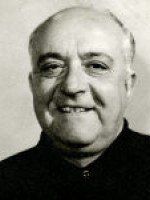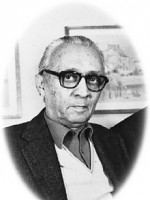Mános Hadjidákis is a Actor and Sound Grec born on 22 october 1925 at Xanthi (Grece)

Manos Hatzidakis (also spelled Hadjidakis; Greek: Μάνος Χατζιδάκις; October 23, 1925 – June 15, 1994) was a Greek composer and theorist of Greek music. He was also one of the main prime movers of the "Éntekhno" song (along with Mikis Theodorakis).
In 1960 he received an Academy Award for Best Original Song for his song Never on Sunday from the film of the same name.
At this point he began writing immensely popular "pop" songs and movie soundtracks alongside more serious works, such as 1954's The C.N.S. Cycle (O Kyklos tou C.N.S.), a song cycle for piano and voice recalling the German lied in its form, if not in style. In 1955 he wrote the score for Michael Cacoyannis' film Stella, with actress Melina Mercouri, singing the movie's trademark song "Love that became a double-edged knife" ("Αγάπη που 'γινες δίκοπο μαχαίρι"). Hatzidakis always maintained that he wrote his serious pieces for himself and his less serious ones to make a living.
In 1959, Hatzidakis met Nana Mouskouri, his first "ideal interpreter", a skilled vocalist who shaped the sounds of his music. It was 1960 that brought him international success, as his song "Never on Sunday" ("Τα παιδιά του Πειραιά"), from Jules Dassin's film Never on Sunday (Ποτέ την Κυριακή), won him an Academy Award and became a worldwide hit.
In 1962, he produced the musical Street of Dreams (Οδός Ονείρων) and completed his score for Aristophanes' Birds (Όρνιθες), another Art Theater production which caused an uproar over Karolos Koun's revolutionary direction. The score was also used later by Maurice Béjart's 20th Century Ballets. He also wrote the music for a song which Arthur Altman added English lyrics to and gave to Brenda Lee. The song was "All Alone Am I". In 1964 he released the album 15 Vespers (Δεκαπέντε Εσπερινοί) with the famous song "Mr Antonis ("Ο Κυρ Αντώνης").
In 1965, his LP Gioconda's Smile (Το Χαμόγελο της Τζιοκόντας) was released on Minos-EMI. In 2004, it was re-released, digitally remastered as an audiophile LP and a CD in the EMI Classics collection. In 1966 he travelled to New York City for the premiere of Illya Darling, a Broadway musical based on Never on Sunday, which starred Mercouri. He did not return to Greece until 1972 due to his opposition to Greece's military dictatorship.
Source : Wikidata
Mános Hadjidákis

- Infos
- Photos
- Best films
- Family
- Characters
- Awards
Nationality Grece
Birth 22 october 1925 at Xanthi (Grece)
Death 15 june 1994 (at 68 years) at Athens (Grece)
Birth 22 october 1925 at Xanthi (Grece)
Death 15 june 1994 (at 68 years) at Athens (Grece)
Manos Hatzidakis (also spelled Hadjidakis; Greek: Μάνος Χατζιδάκις; October 23, 1925 – June 15, 1994) was a Greek composer and theorist of Greek music. He was also one of the main prime movers of the "Éntekhno" song (along with Mikis Theodorakis).
In 1960 he received an Academy Award for Best Original Song for his song Never on Sunday from the film of the same name.
Biography
His very first work was the tune for the song "Paper Moon" ("Χάρτινο το Φεγγαράκι"), from Tennessee Williams' A Streetcar Named Desire staged by Karolos Koun's Art Theatre of Athens, a collaboration which continued for 15 years. His first piano piece, "For a Small White Seashell" ("Για μια Μικρή Λευκή Αχιβάδα"), came out in 1947 and in 1948 he shook the musical establishment by delivering his legendary lecture on rembetika, the urban folk songs that flourished in Greek cities, mainly Piraeus, after the Asia Minor refugee influx in 1922 and until then had heavy underworld and cannabis use connections and were consequently looked down upon. Hatzidakis focused on the economy of expression, the deep traditional roots and the genuineness of emotion displayed in rembetika, and exalted the likes of composers like Markos Vamvakaris and Vassilis Tsitsanis. Putting theory to practice, he adapted classic rembetika in his 1951 piano work, Six Folk Paintings (Έξι Λαϊκές Ζωγραφιές), which was later also presented as a folk ballet. In 1949 he co-founded the Greek Dance Theatre Company with the choreographer Rallou Manou.At this point he began writing immensely popular "pop" songs and movie soundtracks alongside more serious works, such as 1954's The C.N.S. Cycle (O Kyklos tou C.N.S.), a song cycle for piano and voice recalling the German lied in its form, if not in style. In 1955 he wrote the score for Michael Cacoyannis' film Stella, with actress Melina Mercouri, singing the movie's trademark song "Love that became a double-edged knife" ("Αγάπη που 'γινες δίκοπο μαχαίρι"). Hatzidakis always maintained that he wrote his serious pieces for himself and his less serious ones to make a living.
In 1959, Hatzidakis met Nana Mouskouri, his first "ideal interpreter", a skilled vocalist who shaped the sounds of his music. It was 1960 that brought him international success, as his song "Never on Sunday" ("Τα παιδιά του Πειραιά"), from Jules Dassin's film Never on Sunday (Ποτέ την Κυριακή), won him an Academy Award and became a worldwide hit.
In 1962, he produced the musical Street of Dreams (Οδός Ονείρων) and completed his score for Aristophanes' Birds (Όρνιθες), another Art Theater production which caused an uproar over Karolos Koun's revolutionary direction. The score was also used later by Maurice Béjart's 20th Century Ballets. He also wrote the music for a song which Arthur Altman added English lyrics to and gave to Brenda Lee. The song was "All Alone Am I". In 1964 he released the album 15 Vespers (Δεκαπέντε Εσπερινοί) with the famous song "Mr Antonis ("Ο Κυρ Αντώνης").
In 1965, his LP Gioconda's Smile (Το Χαμόγελο της Τζιοκόντας) was released on Minos-EMI. In 2004, it was re-released, digitally remastered as an audiophile LP and a CD in the EMI Classics collection. In 1966 he travelled to New York City for the premiere of Illya Darling, a Broadway musical based on Never on Sunday, which starred Mercouri. He did not return to Greece until 1972 due to his opposition to Greece's military dictatorship.
Best films
Usually with
Filmography of Mános Hadjidákis (33 films)
Actor

Lily of the Harbor (1952)
, 1h26Origin Grece
Genres Drama, Comedy, Comedy-drama, Melodrama, Romance
Actors Alekos Alexandrakis, Níkos Rízos, Mános Hadjidákis, Eleni Zafeiriou, Ánna Kyriakoú
Rating69%





Le capitaine au long cours Giakoumis prend sa retraite à terre aux côtés de sa femme et de son fils adoptif Andrea qui s'apprête lui aussi à devenir officier de marine. Cependant, il a eu une fille Agnès (Agni en grec), avec une prostituée, Maria. Lorsque celle-ci meurt, sa dernière volonté est que le père reconnaisse sa fille. Il s'y refuse car Agnès est elle aussi devenue prostituée. Pour se venger, elle séduit son demi-frère afin de détruire sa réputation. Mais, elle finit par tomber amoureuse de lui et est sauvée par l'amour.
Sound
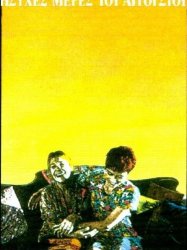
Quiet Days in August (1991)
, 1h48Directed by Pantelís Voúlgaris
Origin Grece
Genres Drama, Anthology film
Actors Thanasis Veggos
Roles Music
Rating67%





Trois histoires avec en toile de fond une Athènes désertée au mois d'août : une chaleur étouffante, pas de bruit, pas de pollution, pas d'embouteillage.

Memed My Hawk (1984)
Directed by Peter Ustinov
Genres Drama
Actors Peter Ustinov, Herbert Lom, Michael Elphick, Rosalie Crutchley, Relja Bašić, Simon Dutton
Roles Music
Rating65%





In 1920s Turkey, a young peasant is smitten with a beautiful young girl, who has been promised in marriage to the fat, dullard cousin of the province's powerful and corrupt governor.
 , 43minutes
, 43minutesDirected by Theo Angelopoulos
Origin Grece
Genres Documentary
Actors Petros Fyssoun
Roles Original Music Composer
Rating9%





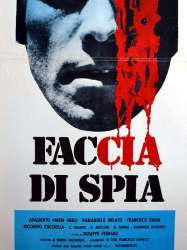
C.I.A. Secret Story (1975)
Directed by Giuseppe Ferrara
Genres Thriller, Horror
Themes Political films
Actors Adalberto Maria Merli, Mariangela Melato, Francisco Rabal, Riccardo Cucciolla, Claudio Camaso, Ugo Bologna
Roles Original Music Composer
Rating52%






Sweet Movie (1974)
, 1h38Directed by Dušan Makavejev
Origin Canada
Genres Drama, Comedy, Comedy-drama
Themes Films about anarchism, Films about sexuality, Rape in fiction, Films about pedophilia, Political films, Films about virginity
Actors Carole Laure, John Vernon, Anna Prucnal, Pierre Clémenti, Sami Frey, George Melly
Roles Original Music Composer
Rating59%





One narrative follows Miss Monde 1984/Miss Canada (Carole Laure), who wins a contest of the "most virgin"; her prize is the marriage to a milk industry tycoon (John Vernon). However, following his degrading puritanical introduction to intercourse, she vents her intention to leave to her mother-in-law who, at that point, nearly has her killed. The family bodyguard (Roy Callender) takes her away, further humiliates her, and finally packs her in a trunk bound for Paris. She finds herself on the Eiffel Tower, where she absently meets and has intercourse with a Latin singer, El Macho (Sami Frey). The sexual act is interrupted by touring nuns who frighten the lovers into penis captivus. In her post-coital shocked state, she is adopted into an artist community led by Otto Muehl, where she finds affectionate care. The commune practices some liberating sessions, where a member, with the assistance of the others, goes through a (re)birth experience, cries, urinates and defecates like a baby, while the others are cleaning and pampering him. Later she is seen acting for an obscene advertisement, in which she is naked, covered in liquid chocolate.

The Pedestrian (1973)
, 1h38Directed by Maximilian Schell
Origin German
Genres Drama
Actors Peggy Ashcroft, Elisabeth Bergner, Lil Dagover, Johanna Hofer, Käthe Haack, Peter Hall
Roles Original Music Composer
Rating66%






The Invincible Six (1970)
, 1h43Directed by Jean Negulesco
Origin USA
Genres Comedy, Action, Adventure
Actors Stuart Whitman, Elke Sommer, Curd Jürgens, James Mitchum, Ian Ogilvy, Behrouz Vossoughi
Roles Music
Rating52%





An adventurous American everybody calls Tex and his partner, an Englishman named Ronald, are foiled in their bid to steal Tehran's precious jewels. In the desert, they join up with four others, including a baron, to plot another heist.
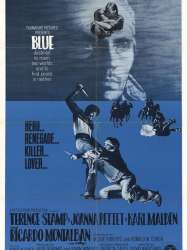
Blue (1968)
, 1h53Directed by Yakima Canutt, Silvio Narizzano
Origin USA
Genres Romance, Western
Actors Terence Stamp, Joanna Pettet, Karl Malden, Stathis Giallelis, Ricardo Montalbán, James Westerfield
Roles Original Music Composer
Rating60%





The year is 1880. Mexican bandit and revolutionary Ortega (Ricardo Montalban) has three sons, Xavier (Carlos East), Manuel (Stathis Giallelis) and Antonio (Robert Lipton), as well as one adopted son, Azul (Terence Stamp), which means "Blue." the color of the young man's eyes. While attacking Texas settlers, Antonio is fatally shot while Azul, feeling pity for one of the settler women, Joanne (Joanna Pettet), whom Manuel is about to rape, puts a deadly bullet into Manuel, as he is shot, himself, by one of the settlers.

Topkapi (1964)
, 2hDirected by Jules Dassin
Origin USA
Genres Drama, Comedy, Comedy thriller, Action, Adventure, Crime, Romance
Themes Heist films, Gangster films, Escroquerie
Actors Melina Mercouri, Peter Ustinov, Maximilian Schell, Robert Morley, Jess Hahn, Akim Tamiroff
Roles Original Music Composer
Rating68%





Elizabeth Lipp (Melina Mercouri) visits Istanbul, where she sees a traveling fair featuring replicas of treasures from the Topkapı Palace. Next she cases the Topkapı, fascinated by the emerald-encrusted dagger of Sultan Mahmud I. Leaving Turkey, she recruits her ex-lover, Swiss master-criminal Walter Harper (Maximilian Schell), to plan a theft of the dagger. They engage Cedric Page (Robert Morley), master of all things mechanical; Giulio, "The Human Fly" (Gilles Ségal), a mute acrobat; and the burly Hans (Jess Hahn), who will provide the muscle needed for the job.
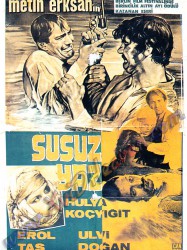
Dry Summer (1963)
, 1h30Directed by David E. Durston, Metin Erksan
Origin Turquie
Genres Drama, Crime, Western
Themes Films about the labor movement
Actors Hülya Koçyiğit, Erol Taş, Ercan Yazgan
Roles Music
Rating77%





Un cultivateur de tabac planifie la ruine de ses concurrents en canalisant l'eau vers sa seule propriété.

America America (1963)
, 2h48Directed by Elia Kazan
Origin USA
Genres Drama, Historical
Themes Films about immigration, La précarité, L'émigration
Actors Stathis Giallelis, Frank Wolff, John Marley, Robert H. Harris, Lou Antonio, Estelle Hemsley
Roles Original Music Composer
Rating76%





In this tall, loosely based upon the life of Kazan's uncle, the director uses little-known cast members, with the entire storyline revolving around the central performance of Greek actor Stathis Giallelis (born 1941), twenty-two years old at the time of production, who is in virtually every scene of the nearly three-hour movie.
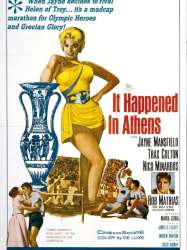
It Happened in Athens (1962)
, 1h40Directed by Andrew Marton
Origin USA
Genres Drama, Comedy, Comedy-drama
Themes Sports films, Films about the Olympic Games
Actors Jayne Mansfield, Xenia Kalogeropoulou, Ivan Triesault, Titos Vandis, Charles Fernley Fawcett, Jean Murat
Roles Music
Rating54%





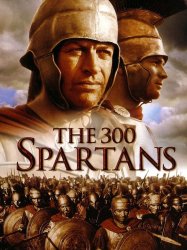
The 300 Spartans (1962)
, 1h49Directed by Rudolph Maté
Origin USA
Genres Drama, War, Action, Adventure, Historical
Themes Political films
Actors Richard Egan, Ralph Richardson, Diane Baker, Barry Coe, David Farrar, Sandro Giglio
Roles Original Music Composer
Rating64%





Xerxes I of Persia leads a vast army of soldiers into Europe to defeat the small city-states of Greece, not only to fulfill the idea of "one world ruled by one master", but also to avenge the defeat of his father at the Battle of Marathon ten years before. Accompanying him are Artemisia I, the Queen of Halicarnassus, who beguiles Xerxes with her feminine charm, and Demaratus, an exiled king of Sparta, to whose warnings Xerxes pays little heed.

Alice in the Navy (1961)
, 1h26Directed by Alekos Sakellarios
Origin Grece
Genres Comedy
Actors Aliki Vougiouklaki, Dimitris Papamichael, Labros Konstadaras, Lambros Konstantaras, Giannis Gionakis, Kóstas Voutsás
Roles Music
Rating63%





En vacances sur l'île de Poros, Aliki (Alíki Vouyoukláki) et Kostas (Dimitris Papamichail) tombent amoureux l'un de l'autre à la suite d'une rencontre joyeuse et comique sur un bateau. Au terme des vacances, les deux jeunes gens se donnent rendez-vous un week-end sous l'horloge du village central.
 Connection
Connection


